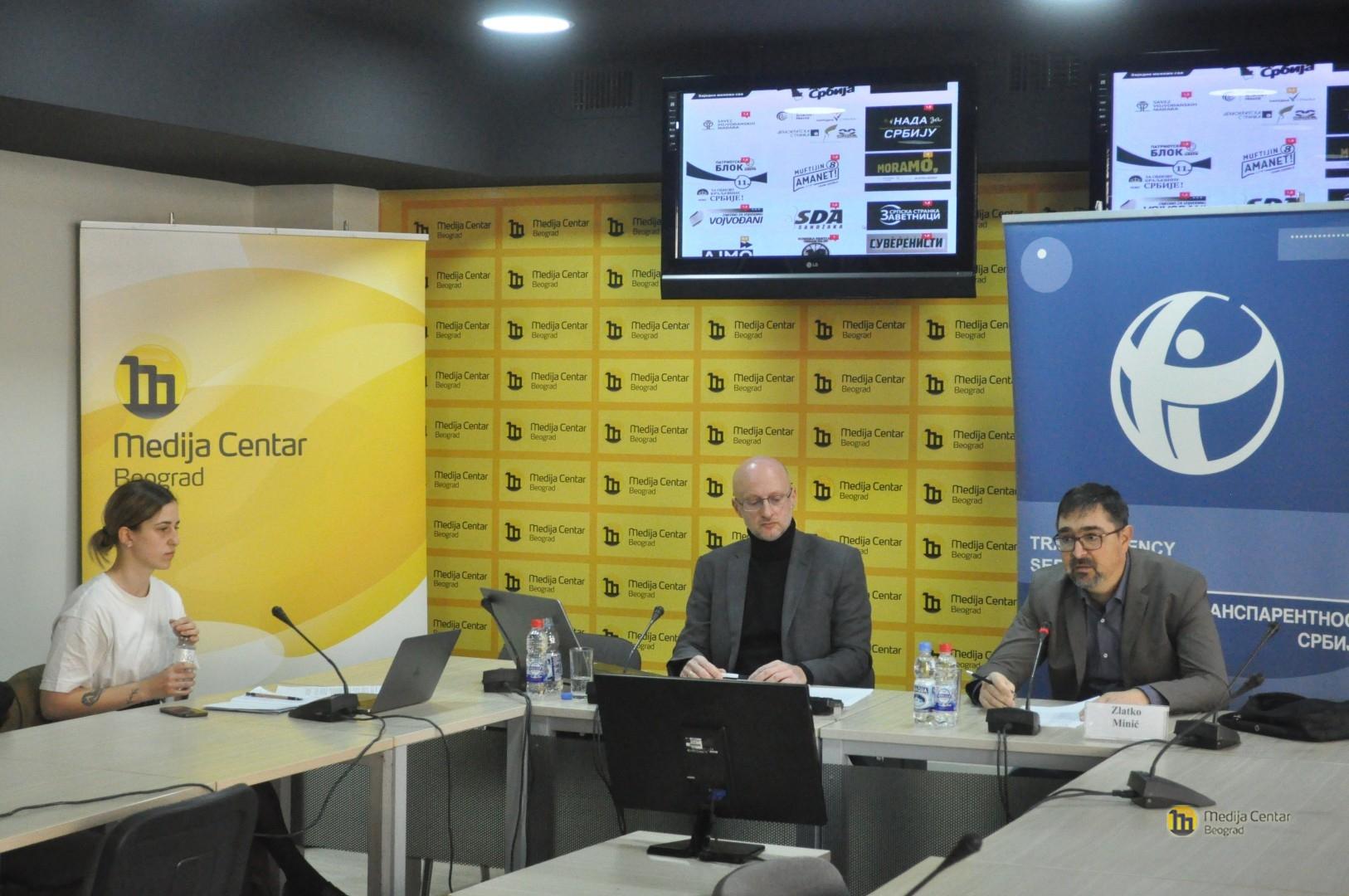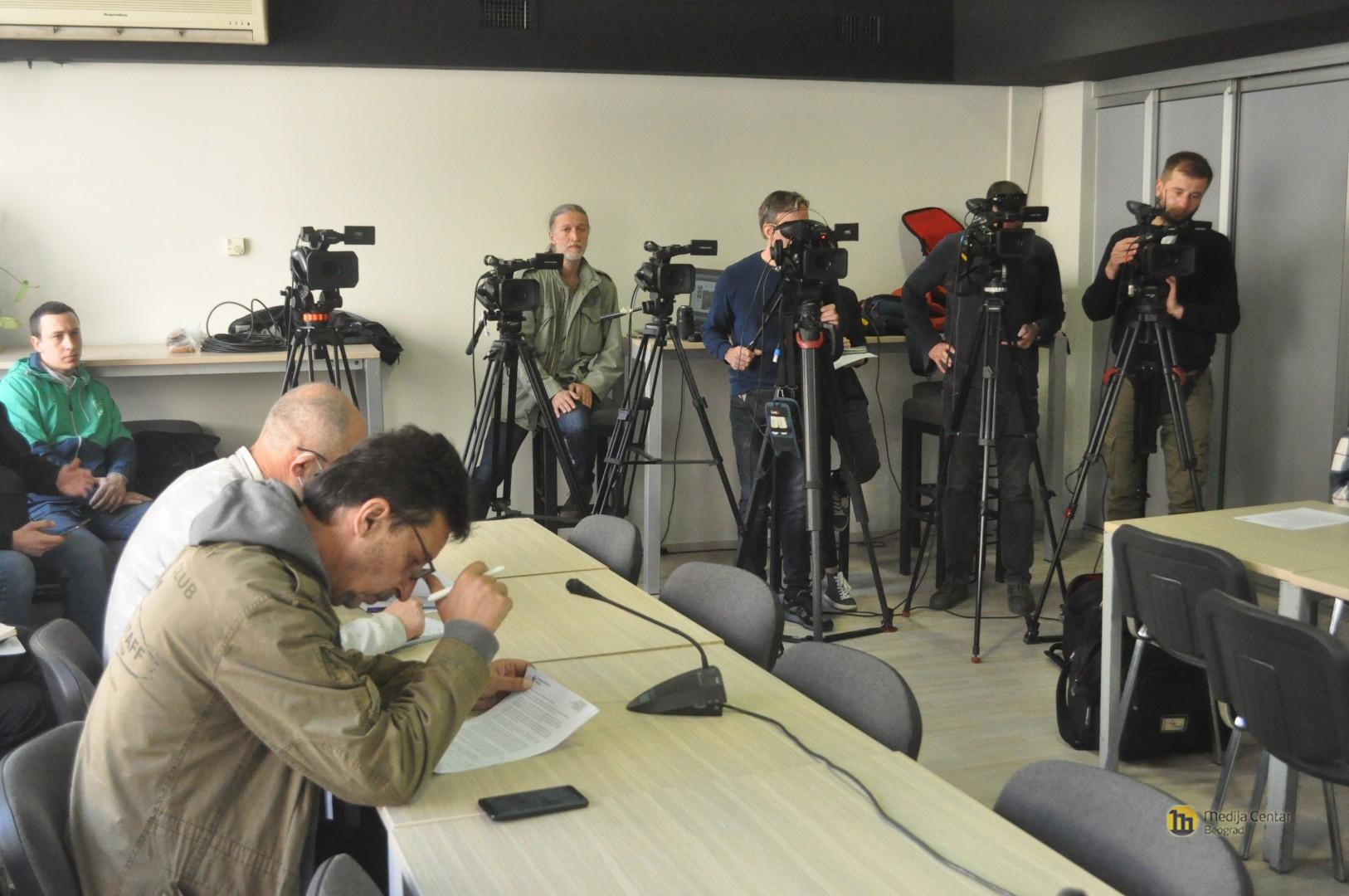Insufficient transparency of election campaign financing
Very little data on the election campaign financing is available to the citizens in the elections 2022, as in the previous ones. The legal changes have brought almost no progress in that regard, Transparency Serbia's research shows.
 The subject of this research is voluntary transparency, that is, what the political entities have published on their websites, and not just the fulfilment of legal obligations, which are insufficient in this regard. The results of the monitoring was presented at the press conference by Nemanja Nenadic and Zlatko Minic.
The subject of this research is voluntary transparency, that is, what the political entities have published on their websites, and not just the fulfilment of legal obligations, which are insufficient in this regard. The results of the monitoring was presented at the press conference by Nemanja Nenadic and Zlatko Minic.
All electoral lists and candidates scored grades between 1 and 2.3 on a scale of 1 to 5. The positive ratings, which raised the average of some lists and candidates above grade 1, were mainly obtained for data not crucial for monitoring cash flows, such as data on social media profiles used in the campaign or the availability of information and parties and candidates' announcements of activities.
On the other hand, data on cash flows, starting from planned expenses, realized expenditures, planned and realized revenues or their structure, were not available in the vast majority – neither on the websites of election participants nor in the media, explained TS associate Zlatko Minic.
Transparency Serbia conducted research based on the TraFiKa methodology developed in cooperation with Transparency International's Czech branch colleagues, with the financial support from the CZech Ministri of foreign affairs, thorught the "Transistion" programe. .
As for campaign money, only one preliminary report (presidential candidate Milos Jovanovic) has been available on the website of the Agency for Prevention of Corruption so far, as well as data on contributions given to several political entities (SPS, SAA, SRS, DSS, Dveri, SDS). It is worrying that only six election participants (less than a third) have data on campaign donations published on their websites. This could mean that other parties did not fulfil their obligation to post contributions that exceed the average salary or that political life in Serbia is so dependent on budget funding that even among party officials, activists and members, there are no interested parties to support their political option to a greater extent financially.
Among the electoral lists, the lists "Ivica Dacic - Prime Minister of Serbia", "Marinika Tepic - United for the Victory of Serbia", "Boris Tadic - Come on, people" received the least bad marks, and among the presidential candidates, Zdravko Ponos and Bosko Obradovic. All of them scored 2,3.
Candidates Biljana Stojkovic, Aleksandar Vucic, Milos Jovanovic, and the lists "Aleksandar Vucic - Together we can do everything" and "We must" received mark 2 for transparency. The other 17 lists and candidates have grades lower than 2.
The electoral lists and candidates were evaluated according to criteria from six areas - 1. Planning campaign expenditures, 2. Presence on the Internet and planned costs of presence on the Internet, 3. Transparent accounts, 4. Structure of planned revenues, 5. List of pre-election events, and 6. Authorized person, election team and campaign volunteers.
The table shows the average scores for those areas for the parliamentary and presidential elections:
|
Area/Elections |
Expenditure planning |
Internet presence |
Transparent account |
Planned revenue |
Pre-election events |
Authorized person |
|
Parliamentary |
1 |
2,5 |
1 |
1,6 |
2,4 |
1,4 |
|
Presidential |
1 |
3 |
1,1 |
1,7 |
3,6 |
1,6 |
Given that less than four days before the election silence almost no data on the money flow in the campaign is publicly available (except for the preliminary report of only one political entity), how much money lists and nominators receive for the campaign from the budget if they win more than 1% votes (0.2% for minority lists) and some data on citizens' contributions, it is beyond doubt that legal changes in this area were not enough to increase insight into cash flows before the election day, said TS Program Director Nemanja Nenadic. He pointed out that one of the reasons for amending the Law on Financing Political Activities was to increase the transparency of money flows during the election campaign.
Based on the ODIHR recommendations and the agreement from the Inter-party Dialogue, the obligation was introduced that the participants in the campaign submit preliminary reports on the costs to the Anti-Corruption Agency no later than seven days before the voting day. The Agency shall publish that report on the website within three days from the day of receipt.
There is no obligation for the election participants to publish these reports on their websites when they send them to the Agency, so even the first party to submit its report to the Agency did not publish it on its website. All this indicates a real possibility that most of the data from the preliminary reports will become available just before the election silence so that citizens will not have the opportunity to find out through the media about the extent to which the costs of the campaign and from what money these expenses will be paid.
To overcome this problem, Nenadic added, Transparency Serbia is proposing to introduce a system of transparent accounts for the campaign, following the example of the Czech Republic. According to the Czech legal solutions, election participants provide open access to the data from the bank account used for the campaign so that the income and expenses are visible at the moment of creation. Having in mind that participants in election campaigns in Serbia pay most of the costs only after the elections when they receive budget grants based on their success, TS suggested that information on assumed and unpaid financial obligations be published (e.g. agreed value of TV commercials, advertising on billboards, and the like).
Instead, based on the recently amended Law on Financing Political Activities, the obligation to submit "preliminary financial reports" was introduced, which should reflect the state of revenues and expenditures as much as 15 days before the day before the vote. Judging by previous experiences, until then, the parties pay only a negligible part of the costs. The opportunity to foresee the obligation to report on those campaign expenses agreed upon up to that point was missed. Thus, it can be expected that some political entities will enter that data while others will not.
At the conference, Marketa Svobodova from TI Czech Republic presented the experiences in that country with the transparency of campaign financing while it is still going on. She pointed out that in 2013, when the survey was conducted for the first time, the response of parties was extremely poor, but that today some have special pages on their websites where they publish data requested by TI. In that way, she pointed out, a better informed citizen is being created who should decide whom to vote.
A recording of the press conference is available on the Youtube channel of TS.
Ratings of all participants in the parliamentary elections:
TraFiKa - Transparentnost finansiranja izborne kampanje za parlamentarne izbore 2022
Ratings of all participants in the presidental elections::
TraFiKa - Transparentnost finansiranja izbornih kampanje za predsedničke izbore 2022
- Upitnik za učesnike na parlamentarnim izborima
- Upitnik za učesnike na predsedničkim izborima
- Kriterijumi za ocenjivanje transparentnosti izborne kampanje

